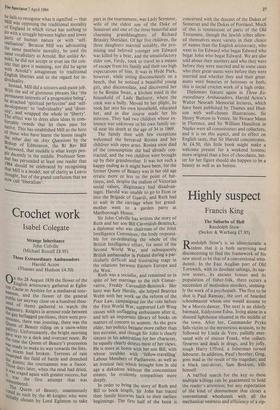Crochet work
Isabel Colegate
Strange Inheritance John Colville (Michael Russell £8.95) Three Extraordinary Ambassadors Harold Acton (Thames and Hudson £4.50)
On the 28 August 1839 the flower of the English aristocracy gathered at Eglin- ton Castle in Ayshire for a mediaeval tour- nament, and the flower of the general Public (or anyway close on a hundred thou- sand of them) gathered to watch the Pageantry. Knights in armour rode between the gay beflagged pavilions, there were pro- cessions, there was jousting, there was the Queen of Beauty riding on a snow-white PoalfreY. Unfortunately, the bright morning gave way to a dark and overcast noon. By the time the Queen of Beauty's procession w.,as ready to make its way towards the lists, the storm had broken. Torrents of rain swamped the field of battle and drenched Tthe guests; the tournament was a fiasco. hree later, when the mud had dried, it Was staged again with greater success, but r. was the first attempt that was `.Inetribered. v The Queen of Beauty, unanimously °ted as such by the 40 knights who were initially chosen by Lord Eglinton to take part in the tournament, was Lady Seymour, wife of the eldest son of the Duke of Somerset and one of the three beautiful and charming granddaughters of Richard Brinsley Sheridan. Of her five children, the three daughters married suitably, the pro- mising and beloved younger son Edward was killed by a bear, and the unsatisfactory elder son, Ferdy, took to travel as a means of escape from his family and their too high expectations of him. It was in Hyde Park, however, while sitting disconsolately on a bench, that he noticed a beautiful young girl, also disconsolate, and discovered her to be Rosina Swan, a kitchen maid in the household of Lady Bathurst, where the cook was a bully. Moved by her plight, he took her into his own household, educated her, and in due course made her his mistress. They had two children whose ex- istence was unknown to his own family un- til near his death at the age of 34 in 1869.
The family then with few exceptions welcomed the bereaved Rosina and her children with open arms. Rosina soon died of the consumption she had already con- tracted, and the two children were brought up by their grandmother. It was not such a happy ending as it might have been, for the former Queen of Beauty was in her old age erratic more or less to the point of tat- tiness, and, despite the realism of Victorian social values, illegitimacy had disadvan- tages. Harold was unable to go to Eton or into the Brigade of Guards, and Ruth had to wait in the carriage when her grand- mother went to a garden party at Marlborough House.
Sir John Colville has written the story of Ruth and her son Bill Cavendish-Bentinck, a diplomat who was chairman of the Joint Intelligence Committee, the body responsi- ble for co-ordinating the whole of the British Intelligence effort, for most of the Second World War, and subsequently British ambassador in Poland during a par- ticularly difficult and frustrating stage in the relations between Eastern Europe and the West.
Ruth was a socialist, and remained so in spite of her marriage to the rich Conser- vative, Freddy Cavendish-Bentinck. Her hero was Keir Hardie, she helped Beatrice
Webb with her work on the reform of the Poor Law, campaigned for the vote before the First World War, supported Left Wing causes with unflagging enthusiasm after it,
and left an important library of books on matters of concern to women. As she grew older, her politics became more rather than
less extreme, and though Sir John is clearly sincere in his admiration for her character,
he equally clearly detests most of her views.
He is more at home with her son Bill, with whose troubles with 'fellow-travelling' Labour Members of Parliament, as well as an ironical fate which brought him in old age a dukedom without the concomitant estates, he evidently sympathises more deeply.
In order to bring the story of Ruth and Bill to book length, Sir John has traced their family histories back to their earliest beginnings. The first half of the book is concerned with the descent of the Dukes of Somerset and the Dukes of Portland. Much of this is reminiscent of parts of the Old Testament, though the Jewish tribes allow- ed themselves more variety in their choice of names than the English aristocracy, who went in for Edward who begat Edward who begat John who begat Edward. We are also told about their mothers and who they were before they were married and in some cases who their great-aunts were before they were married and whether they and their great- aunts were beauties or heiresses or both; this is social crochet work of a high order.
Diplomats feature again in Three Ex- traordinary Ambassadors, Harold Acton's Walter Neurath Memorial lectures, which have been published by Thames and Hud- son with well-chosen illustrations. Sir Henry Wotton in Venice, Sir Horace Mann in Florence, and Sir William Hamilton in Naples were all connoisseurs and collectors, and it is on this aspect, and its effect on English taste, that Sir Harold concentrates. At £4.50, this little book might make a welcome present for a weekend hostess; more original than a box of chocolates, bet- ter for her figure should she happen to be a beauty as well as an heiress.










































 Previous page
Previous page